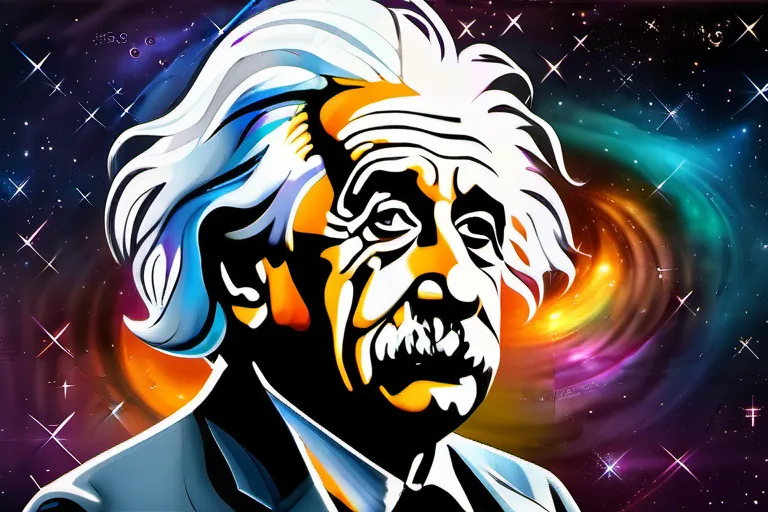Exploring the philosophical beliefs and teachings of Albert Einstein on spirituality, life, and the universe.
Albert Einstein, one of the greatest physicists in history, was not only a brilliant scientist but also a deep thinker with profound thoughts on spirituality and life. In this article, we delve into his beliefs and teachings that offer valuable insights for us today.
Einstein’s Early Life and Formative Influences
Albert Einstein’s early life was a tapestry woven with threads of curiosity and wonder, setting the stage for his profound spiritual insights. Born in Ulm, Germany, in 1879, he grew up under the shadow of his father’s business failures, a stark reminder that life is not always smooth sailing. Could it be that even great minds must confront the trials of existence?
The young Einstein was deeply influenced by his mother’s love for music and his Jewish heritage, particularly the idea of a personal God who could bring solace to troubled souls. He once said, ‘I have no truck with deities who reward and punish.’ This statement is intriguing; it suggests that Einstein sought a spirituality that transcended religious dogma.
His education at the Luitpold Gymnasium in Munich further deepened his intellectual curiosity. The rigorous curriculum and the questioning spirit of his teachers ignited a fire within him, leading to his famous question: ‘Imagination is more important than knowledge.’ Could it be that imagination—rather than mere belief—is what drives true understanding?
Einstein’s time in Switzerland at the Swiss Federal Polytechnic School (ETH) exposed him to a diverse community and new ideas, including those of pacifism. This period was pivotal; he engaged with thinkers who challenged his beliefs and broadened his perspective on life. How does one navigate the complexities of the human experience without rigid adherence to tradition?
His experiences also included witnessing the injustices of antisemitism, which shaped his belief in social justice and ethical living. The question arises: Can a scientist be both rational and spiritually engaged, or must these realms remain separate?
In his personal life, Einstein found solace in the beauty of nature and the elegance of mathematical equations. His love for hiking and photography offered him moments of reflection, akin to seeking answers from the vastness of the universe itself. Is it possible that the patterns we find in nature are reflections of a deeper order?
Einstein’s early life was marked by a quest for understanding, both scientific and spiritual. His upbringing and education instilled in him a desire to question and explore, setting the stage for his later philosophical beliefs about the interconnectedness of all things and the beauty of existence itself. Could it be that our own journeys are similarly intertwined with the pursuit of knowledge and meaning?
The seeds of Einstein’s spirituality were planted early in life, growing into a philosophy that values the personal quest for truth and the interconnectedness of all beings.
Einstein’s View on God and the Universe
Albert Einstein, often hailed as one of the greatest minds of the 20th century, had profound thoughts on the nature of God and the universe. How could such a brilliant physicist contemplate spirituality? Wasn’t he focused solely on the mechanics of the cosmos? Let’s delve into Einstein’s musings on this intriguing subject.
When asked about his beliefs in God, Einstein famously replied, ‘I do not believe in a God who wants an effect without a cause. I believe in Spinoza’s God, who reveals himself in the lawful harmony of what exists, not in a God who concerns himself with the fates and actions of human beings.’ Here, Einstein aligns his views with Baruch Spinoza’s philosophy, emphasizing a lawful order and harmony rather than a personal deity.
Einstein’s thoughts on the universe are best captured by his own words: ‘The most beautiful thing we can experience is the mysterious. It is the source of all true art and science.’ This reflects his awe at the intricate design of the cosmos, a view that transcends the purely mechanical to something deeply spiritual.
He also pondered on the interconnectedness of all things, a concept that echoes through his famous equation E=mc². Energy and matter are not separate but manifestations of the same substance—akin to the idea in many spiritual traditions that everything is interconnected and interdependent. Einstein’s theory of relativity, with its emphasis on the fabric of space-time, hints at a universe where nothing exists in isolation.
In his letter to a friend, he wrote, ‘The most beautiful experience we can have is the mysterious. It is the fundamental emotion that stands at the cradle of true art and true science. It is better to know some of the questions than all of the answers.’ This statement encapsulates Einstein’s approach to both science and spirituality; he valued curiosity over certainty, seeing wonder as a gateway to deeper understanding.
Einstein’s views on God and the universe reveal a deep-seated reverence for nature and an appreciation of the beauty that can be found in scientific inquiry. His thoughts inspire us to look beyond the material world, to see the elegance and interconnectedness that underlies all things. In exploring these ideas, we find not just answers but a pathway towards a more profound understanding of life itself.
Einstein’s Philosophy of Science and Spirituality
Albert Einstein, often seen as a towering figure in science, also had profound insights into spirituality and life that challenge our conventional notions. How did his approach to understanding the universe inform his view on life? Wasn’t he suggesting that the same principles that govern the cosmos apply to human existence?
Einstein often spoke of a ‘cosmic religious feeling,’ hinting at a deeper, mystical connection between the observer and the observed. He believed in a unified theory not just for physics but also for life. If we consider his famous quote about thinking as a ‘daring jump…and then landing safely on the other side,’ it’s clear that he valued intuition and imagination alongside logic and reason.
Could this mindset have been a reflection of his spiritual beliefs, guiding him to see life as a grand experiment? He once said, ‘Imagination is more important than knowledge. Knowledge is limited. Imagination encircles the world.’ This statement encapsulates his view that there’s so much we don’t know, and curiosity can lead us to discover the unknown.
For Einstein, science and spirituality were not in conflict but rather complementary. Just as he sought harmony between scientific theories, he also looked for a balance between rationality and intuition. In life, this might mean embracing the unknown with open arms, trusting your gut feelings even when logic suggests otherwise. It’s like walking a tightrope; you need both careful calculation and a leap of faith to reach the other side.
Moreover, Einstein’s belief in the interconnectedness of all things aligns beautifully with his spiritual philosophy. Just as every particle in the universe is influenced by every other, so too are our lives intertwined. Can we not see this interdependence in our relationships and communities? How often do we forget that what affects one person can ripple through a whole network of lives?
In essence, Einstein’s spirituality teaches us to view life with wonder, curiosity, and a sense of unity. It encourages us to approach challenges with both logic and imagination, to embrace the unknown with humility, and to recognize our place in the grand tapestry of existence.
Einstein’s Teachings on Curiosity and Humility
Albert Einstein, beyond his monumental contributions to physics, was also deeply rooted in a philosophy that emphasized curiosity and humility. How often do we stop to question the world around us? How many times have we accepted our understanding of reality without seeking deeper insights?
Einstein believed that curiosity was not just a key to unlocking scientific mysteries but also a fundamental aspect of human nature. He once said, ‘Imagination is more important than knowledge.’ This quote encapsulates his view that true innovation and discovery arise from asking why, rather than simply accepting what we are taught.
Imagine the universe as a vast library filled with countless secrets waiting to be deciphered. Einstein was like a curious explorer, constantly seeking new ways to understand this grand narrative. He often stressed that his work in physics did not arise from strict adherence to established theories but rather from a deep-seated want to know more.
Moreover, humility played a crucial role in Einstein’s approach to science and life. He recognized that our current understanding of the universe is inherently limited by our own perceptions and tools. How many times do we assume we have all the answers? Einstein knew that true wisdom lies in acknowledging what we don’t know.
It’s as if we are navigating a complex maze, trying to find our way through with only the light from our flashlights. Each discovery is like uncovering one corner of a vast cavern; it illuminates more questions than answers. Einstein’s approach taught us that every answer leads to more mysteries, and this continuous questioning is what drives progress.
So, as we explore the wonders of the universe, let us carry forward Einstein’s legacy by remaining curious and humble. Let us never stop asking why, for in doing so, we may just uncover new dimensions of reality that are waiting to be discovered.
Einstein’s Legacy and Impact on Modern Spirituality
Albert Einstein’s spirituality goes beyond just scientific inquiry; it’s a profound exploration into the essence of life itself. How can we align our lives with the beauty and complexity of the universe? Einstein often spoke about the interconnectedness of all things, likening this concept to the harmony in a symphony where each note complements another. Imagine the universe as a vast orchestra; every atom plays its part in creating the grand symphony of existence. How does your life contribute to this melody? Is there a way for us to live our lives with more awareness and purpose, much like musicians who are deeply connected to their instruments?
Einstein believed that the pursuit of knowledge was not just an intellectual exercise but a spiritual one as well. He often reflected on the mysteries of the universe, stating, “The most beautiful thing we can experience is the mysterious.” Isn’t life itself a mystery that demands our full attention and reverence? How do we approach this mystery with awe and wonder? Can we embrace every moment with a sense of curiosity and openness, much like how a child approaches new experiences with fresh eyes? Is it possible to live in a way that reflects the same simplicity and purity as a newborn?
Einstein’s teachings on spirituality challenge us to see beyond the surface level. He often spoke about the need for compassion and empathy in our interactions, arguing that “imagination is more important than knowledge.” How can we use our imagination to envision a world where every individual feels valued and loved? Can we apply this principle in our daily lives by cultivating kindness and understanding towards others? Is there a way for us to contribute to the greater good, much like how bees work together to create honey?
In essence, Einstein’s spirituality teaches us to live with intention and purpose. It’s about finding our place in the grand scheme of things and contributing positively to the world around us. Is your life a part of this grand harmony? By embracing curiosity, humility, and a sense of wonder, we can navigate life with more clarity and fulfillment. Are you ready to explore the depths of your own spirituality and contribute to the beauty of existence?
Applying Einstein’s Lessons to Our Lives
Imagine stepping into Einstein’s mind, where time and space are not rigid but fluid. How might we apply this perspective to our daily lives? Could understanding that everything is interconnected and ever-changing help us navigate life’s complexities more gracefully?
Embrace Flexibility: Just as Einstein saw the universe through a lens of constant change, so too should we see ourselves within it. Life is not a straight path but a winding road with many turns. Be flexible in your goals and open to new opportunities that might come your way.
Question Everything: Einstein’s journey began with questioning the fundamental laws of physics. In our lives, shouldn’t we also question the norms and conventions we adhere to? Are there better ways to approach challenges or connect with others?
Consider how curiosity about the world around you might lead to new insights and discoveries in your personal life. Einstein’s belief in simplicity as a path to deeper understanding can help us strip away unnecessary complexities and focus on what truly matters.
- Simplify Your Life: Can we live with less? Less clutter, fewer commitments, simpler meals?
- Find Joy in Simplicity: Is there beauty in a quiet evening at home or a walk through nature without the distraction of technology?
Reflect on how Einstein’s emphasis on harmony and unity might inspire us to seek more peace in our relationships. Can we find ways to connect with others that are not based on superficial differences but on shared humanity?
Promote Peace: How can we contribute to a world where people understand each other better? Could acts of kindness, empathy, and respect bridge divides and bring us closer together?
Finally, consider how Einstein’s belief in the interconnectedness of all things might guide us to be more responsible stewards of our planet. Can we adopt a mindset of sustainability, knowing that every choice we make affects not just ourselves but the world around us?
Sustainability and Responsibility: How can we reduce waste, use resources wisely, and support environmental causes? Our actions today will shape tomorrow’s world, so let’s choose to do what is right.
Conclusion
 Einstein’s spirituality teaches us to embrace curiosity, humility, and the interconnectedness of all things in the universe. By understanding these lessons, we can live more fulfilling lives and contribute positively to the world around us.
Einstein’s spirituality teaches us to embrace curiosity, humility, and the interconnectedness of all things in the universe. By understanding these lessons, we can live more fulfilling lives and contribute positively to the world around us.











